Say we have a Wilkinson power divider:
So far as I understand it, if we say port 1 is the input, and the other ports are outputs, then the power is split evenly between the outputs.
If one of the outputs is not perfectly matched, and so reflects some power back, half this power is dissipated in the resistor, half goes out port 1, and none (ideally) of it goes to the other output port.
However, does this port isolation hold true if port 1 isn't driven by a Z0 source? And if not, why and how?
